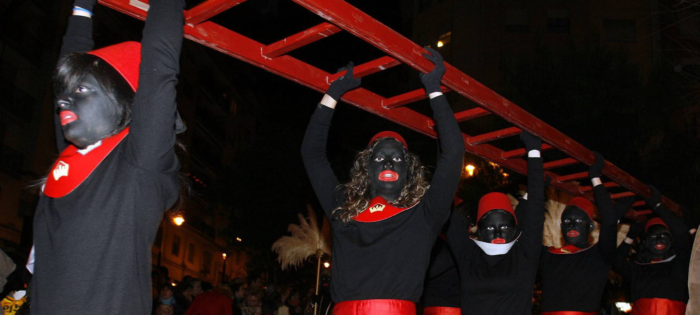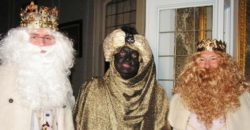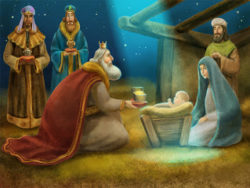It is only tradition, right? Blackface in Los Tres Reyes

by Simone Hall
As I walk around Sol, the most central part of the Madrid I’m confronted with mannequins that spur anger within me. Blackface. Two white mannequins and a third painted a dirty streaky brown. It's only a mannequin, one might think. However, the truth is, blackface is an inherent part of The Three Kings tradition here in Spain and it is highly offensive.

Madrid during Christmas is a beautiful place. Its shines from the lights of Gran Vía. The festivities flow through Plaza Mayor, with its sparkling grand Christmas tree and marvellous festive traditions, yet, it is from within some traditions where problems arise. As the celebrations of Los Tres Reyes (The Three Kings) has approached, with the official holiday on the 6th of January, I have felt myself become increasingly uncomfortable about the use of blackface that I know I will undoubtedly witness.
Los Tres Reyes, also known as the Biblical Magi, is the celebration of the latter part of the nativity story where the three kings (whom are more commonly referred to as the 'wise men' outside of Spain), visit baby Jesus and offer him their gifts. In Spain, this is the prime time for children to receive gifts. One of the kings was named Balthazar, and many, especially here in Spain, believe him to have been black.

Every year across the country, parades take place. Many parades feature white actors “blackening up” themselves in order to represent this religious figure. In 2015, Madrid committed to using only black actors for Balthazar’s role in the parade. Although it still was not openly claimed that this was due to the racist nature of the depiction, it was stated that the increased multiculturalism within the city acted as proof that there was no need for the role to be continued being portrayed by a white actor. Even though Madrid is changing its views towards blackface in some respects, it seems this view is not upheld across the city in all aspects of its public culture. It is shocking to walk into a variety of shops selling Three Kings apparel and find it commonplace for the costume's product design to depict white models, sometimes child models, painted with a black face.
Outside of Madrid, things are even worse. In Alicante for example, every year in Alcoy thousands of Spaniards flock into the streets gifting presents to children whilst dressed as Balthazar. Not only do these people dress up as the king, but they paint their skin the colour black and paint their lips bright red. Alcoy shockingly still continues to defend this as tradition.
As a black person I never will tolerate blackface. When I see it happening instinctively, I know it is wrong; however often I am confronted with the ignorant phrases “it's only tradition” or worse, the exasperating “why are you so sensitive?”. To these ignorant people I say, I am “sensitive” because these acts of blackface are not the so called “innocent” traditions claimed. They do not depict the true reflection of a black person. These acts of blackface are purposefully derogatory and based on racial stereotyping of both the physical appearance, and at times, behavioural traits of black people, both of which have oppressed the black community for centuries. Looking at these people in blackface, I yearn to know how they do not see where the offence is. In what world does these dark painted faces and bright red lips depict what you see when you look at me or another black person. The answer is they do not. All they do is mock us. It's not tradition. Its racism.
I am currently working as a language assistant, and within this role we have the power to educate the youth of Spain on how certain “traditions” are offensive. Yet, when a friend of mine did a presentation on the offensiveness of blackface during Halloween, the classroom teacher dismissed it, using his authority to re-teach the students that it is “not a real problem” and “not actually offensive.''
Blackface in Spain is not isolated only to The Three Kings celebrations. I have noticed it is extremely popular, especially during Halloween or fancy dress parties and during other celebrations, such as the festival Moros y Cristianos (Moors and Christians). It seems that the main issue in Spain is that people do not understand why it is extremely offensive. The reasoning for this provokes me to wonder: Is it deep-rooted racism or ignorance? Either way, both stem from a refusal to acknowledge the hurt and anger it will instil in minorities such as myself.
Study Abroad Columnist: Simone Hall. Classical Literature and Spanish student, 3rd year. Currently teaching for the Comunidad de Madrid in Aranjuez, Madrid.
